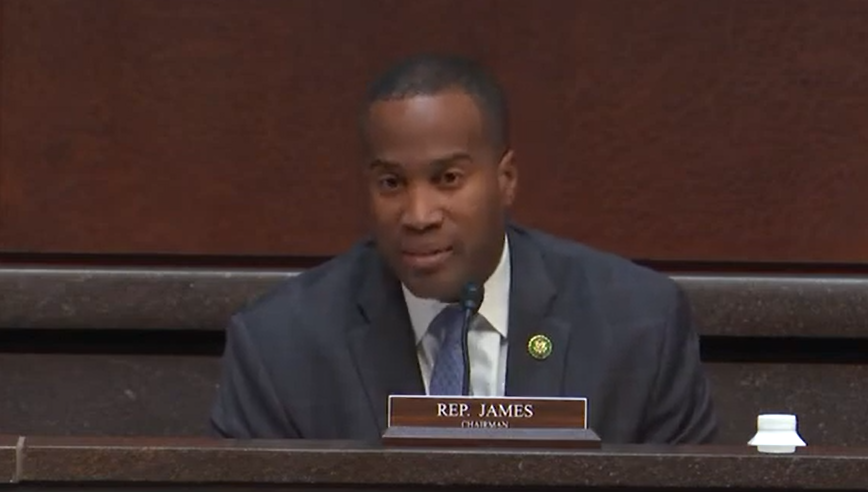
Banner

US bill puts SA under the microscope
Diplomatic relations between Washington and Pretoria have slid further following a new bill introduced in the United States House of Representatives last week by two Republican legislators.
The bill calls for a sweeping review of the US-South Africa bilateral relationship and for the possible imposition of sanctions on senior African National Congress leaders. It also demands a hardline reassessment of South Africa’s ties to regimes considered adversarial to the US.
The legislation, tabled by Texas Congressman Ronny Jackson and Michigan Congressman John James, directly accuses South Africa of aligning with global powers hostile to American interests, namely China, Russia, Iran, and with Hamas, and abandoning its long-claimed policy of non-alignment. James brought forward a similar bill last year.
The proposed US-South Africa Bilateral Relations Review Act of 2025 identifies multiple concerns, including Pretoria’s deepening engagement with authoritarian regimes; its increasingly antagonistic stance toward Israel and its case at the International Cout of Justice (ICJ); and its alleged support for Hamas, which is designated a foreign terrorist organisation by the US government.
The bill states that South Africa’s foreign policy trajectory “undermines US national security and foreign policy interests”, and demands consequences for what it deems betrayal by a supposed ally.
“Trump’s America has become a cold and forbidding place for Pretoria,” said Professor Hussein Solomon at the Centre for Gender and Africa Studies at the University of the Free State. “The ANC [African National Congress] is effectively persona non grata in Washington. Importantly, however, this doesn’t mean that South Africa has been targeted, as the Democratic Alliance (DA) and others like AfriForum have been in and about in the US of late.”
While some commentators say the move could have serious consequences for South Africa’s global standing and economic interests, others hold a more cautious or dismissive view.
Former US diplomat and political commentator, Brooks Spector, told the SA Jewish Report that the bill was introduced by “fringe” Republican congressmen, not senior figures, and was unlikely to progress.
“Any congressman can introduce legislation, but getting it scheduled for a committee hearing, let alone a full House vote, is a different matter,” said Spector. “My crystal ball is misty, but I don’t see this going far. Congress is overwhelmed right now, and South Africa isn’t top of mind, it’s well down the playlist. It may not seem like that from here, but this is the reality.”
Spector said the bill had “more of a domestic appeal” than a foreign policy impact, particularly coming from these congressmen, who didn’t come from urban cities but rather from rural or peri-urban districts where concerns about issues like “replacement theory” exist.
Spector advised that rather than getting agitated about the bill, the ANC should prepare itself to respond effectively when such issues arise. “They [South African government] need to have a solid, well-argued brief and work on building better connections with House and Senate members, even without an ambassador in place.”
In response to mounting pressure, International Relations and Cooperation Minister Ronald Lamola reaffirmed the government’s position, saying that South Africa wouldn’t back down from its ICJ case against Israel.
Lamola defended the ICJ case in response to a parliamentary question, saying it aimed to “preserve the existence of the Palestinian people as a group and to end all acts of apartheid and genocide against them”.
He emphasised that the government had acted “in accordance with its international obligations”, and that US aid cuts wouldn’t influence Pretoria’s legal or diplomatic stance.
“The government doesn’t intend to reconsider South Africa’s case against Israel at the International Court of Justice following the withdrawal of all the United States of America’s aid,” Lamola stated firmly.
Political commentator Daniel Silke said South Africa was already under review given the latest stiff 30% tariff hike on selected goods, which effectively nullified the AGOA (Africa Growth and Opportunity Act). “A further review of relations could be extremely uncomfortable for the ANC, but it is all speculative,” he said.
“It is compounded by the country’s own problems within the Government of National Unity [GNU]. The dissatisfaction within the GNU will play into the broader view in Washington that there is political instability in SA,” he said.
DA MP Michael Bagraim said employment was already affected by the latest US review of South Africa.
“As a labour lawyer and someone focused on job creation, I can say this latest development has been disastrous for employment,” Bagraim said. “The government’s handling of foreign affairs has been deeply damaging, possibly the worst in five years when it comes to job losses. We need to rethink our entire approach, starting with a complete overhaul of Dirco [the department of international relations and cooperation]. For years, the US has supported South Africa financially with little in return, and now that those subsidies are at risk, the government is playing the blame game. The ANC simply doesn’t understand how to act in the national interest.”
This is the second time in little more than a year that US legislators have introduced such legislation. In June last year, the House approved a bipartisan bill with an amendment calling for a review of South Africa’s national security risks to the US, but didn’t proceed further under former US President Joe Biden’s administration.
In February, four US Republican congressmen wrote to President Donald Trump urging him to take action against South Africa specifically, asking Trump to scrap AGOA. They accused the ANC of running an “ethno-nationalist gangster regime” and among other complaints, accused the country of being “Hamas propagandists”.
The bill empowers the US president to impose sanctions on individuals deemed responsible for human rights violations or corruption under the Global Magnitsky Act. It directs the secretary of state and secretary of defence to determine whether South Africa’s activities have undermined American interests, with a report to be submitted to Congress within 30 days of enactment.
Whether the bill gains momentum in the US Congress remains to be seen, but its introduction is the clearest sign yet that Washington’s patience with the ANC-led government may be wearing thin.











Alfreda Frantzen
April 10, 2025 at 7:19 pm
love that description: “ethno-nationalist gangster regime” hahahaha